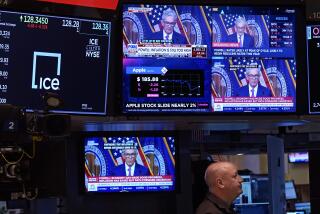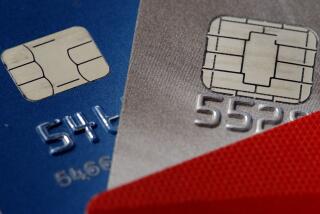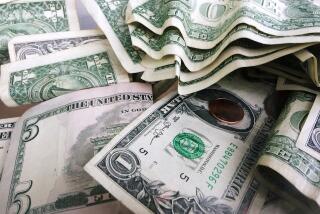Earning zero and feeling good
- Share via
Has the modern world ever been willing to earn so little on so much?
The amount Americans have in basic savings accounts at banks and thrifts rose to a record $5.06 trillion at the end of May, a jump of $209 billion since the start of the year.
Nobody is parking cash at a bank for the yield. These accounts — passbook-type vehicles and money market deposit accounts — are mostly earning less than 1% annual interest.
As for mutual funds, plenty has been written about small investors’ unprecedented purchases of bond funds over the last year in the hunt for better returns.
But even as bond portfolios now hold a record $2.4 trillion, individuals and institutions still sit with
$2.8 trillion in money market mutual funds that pay next to nothing. The average annualized fund yield is a barely detectable 0.04%.
Some of that money fund cash is owned by U.S. companies, which as of March had a record total $1.8 trillion in liquid assets listed on their books, according to Federal Reserve data. Businesses have boosted their cash levels by 26% over the last year, the biggest-ever increase, according to Wall Street Journal calculations.
The world’s richest people, too, are hoarding cash. You might imagine that they got wealthy by taking risks, not by playing it safe with their money. But they’re playing it safe now: The annual Boston Consulting Group report on the world’s millionaires, issued this week, estimated that those households (there are 11.2 million of them) overall hold 48% of their financial assets in cash accounts, up from 44% in 2007.
Is this capitalism at its best? Ideally, capital should be allocated to its most productive uses, to the best new ideas. And we’re supposed to be willing to take on greater risk in search of higher returns.
Yet for many investors and businesses, cash keeps building up while offering little to no return. The money in your savings account may or may not be productive for the bank, but it’s probably never been less productive for you.
We all know where to affix the blame for this state of affairs. In the wake of the world’s worst financial crisis since the Great Depression, and the devastation it wrought on stocks and real estate values, fear has triumphed over greed. For many investors, capital preservation now trumps all else.
Some large portion of the population that was comfortable in 2007 having, say 60% of their money in stocks, 30% in bonds and 10% in cash now has significantly lowered the amount allocated to stocks. Watching the market drop 50% in six months left a lot of people, particularly older folks, with a new attitude toward risk — as in, “I want to take a lot less of it.”
Even as share prices rebounded over the last year, many individual investors refused to buy in, preferring instead to shift more money to bonds and to bank savings. And just as some investors began to show renewed interest in stock mutual funds this spring, they were blindsided by the May sell-off and its accompanying wild volatility, including the absurd “flash crash” of May 6.
Over the last six weeks anyone looking for excuses to be more cautious with their money has seen the list grow ever longer: Europe’s government-debt mess, the Gulf of Mexico oil spill, the threat of war between North and South Korea, and the much-weaker-than-expected gain in U.S. private-sector jobs last month, which raised fresh doubts about the economic recovery.
Next up, Congress is promising to finish its landmark financial-regulation overhaul this month. As Rep. Paul E. Kanjorski (D-Pa.) put it, Congress believes it must respond to the credit crisis by “fundamentally changing the way that Wall Street operates.” But if one of the consequences is to make the financial industry more conservative, does that sound like a recipe for faster or slower economic growth?
In the face of mind-numbing uncertainty, the more cash you hold, the more comfortable you’re likely to feel, of course. It can’t gain much value but, far more important, it can’t lose (aside from the risk that inflation will eat into your spending power). Cash is a constant — like the sun coming up each day.
“They don’t think about earning just 1%,” Monish Kumar, one of the authors of Boston Consulting’s global-wealth report, said of the millionaires and their mountain of cash. “They see that they’re not losing.”
Among the less-well-heeled, however, there’s another reason savings balances in banks have grown so large. Many people had been expecting the Federal Reserve to begin raising short-term interest rates from their near-zero levels this year as the economy improved, leading to higher yields on savings accounts and on certificates of deposit.
In other words, cash accounts were ballooning not because savers and investors were happy earning nothing on their money, but because they believed it was silly to lock in a low yield on a CD or bond.
But Europe’s debt crisis and the disappointing U.S. jobs report for May have made it far less likely that the Fed will tighten credit before fall at the earliest.
Some economists believe short-term interest rates will remain depressed for far longer given the challenges facing the recovery, including near-double-digit unemployment, a struggling small-business sector and the still-shaky banking system, which naturally benefits by not having to pay up for deposits.
Economist Edward Yardeni, head of Yardeni Research in Great Neck, N.Y., figures the Fed won’t move before 2012. Another 18 months of paltry cash returns? “It could really start to get very painful for those who don’t expect to get rich [off cash savings] but who do expect to earn some kind of return better than zero,” Yardeni said.
Count millions of senior citizens in that camp. Rock-bottom short-term rates are a case of “Grandma subsidizing Goldman Sachs,” Yardeni said.
Low rates also are a subsidy for business and consumer borrowers. But therein lies another obstacle to higher savings rates: Banks don’t have to compete aggressively for deposits because they’re already swimming in cash at a time when loan demand remains depressed.
No doubt bankers in general are more tightfisted about lending after the massive real estate loan losses they’ve incurred. At the same time, the world is awash in excess capacity in just about any industry you can name — which means many or most companies aren’t looking to borrow to expand.
All of this strongly suggests cash returns aren’t going up any time soon.
Surely, then, greed can’t stay suppressed forever. To have a shot at earning any kind of decent return on your money you’ll have to move into stocks, bonds, real estate or something else more complicated and, obviously, riskier. Think of it in that light and the cash hoard seems incredibly bullish for the markets.
There’s another possibility: Cash accounts will mushroom further because we’ll find that, rather than being irrationally worried about the future, many people playing it ultra-safe have called it correctly — foreseeing an economy that sinks again, taking most riskier investments with it.
Zero can only be the preferred investment return if everything else looks like it will be prefixed by a minus sign.
More to Read
Inside the business of entertainment
The Wide Shot brings you news, analysis and insights on everything from streaming wars to production — and what it all means for the future.
You may occasionally receive promotional content from the Los Angeles Times.










